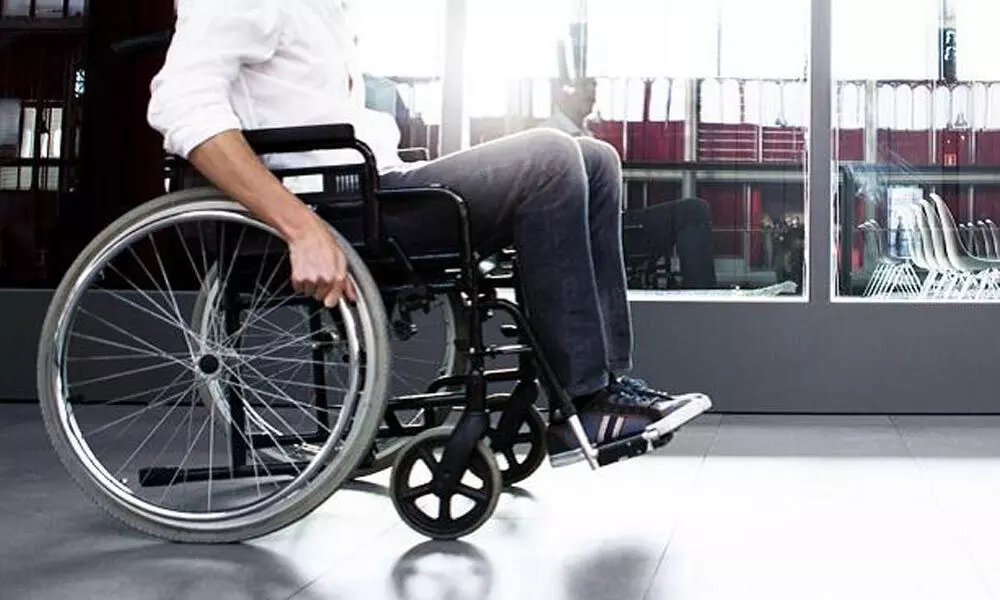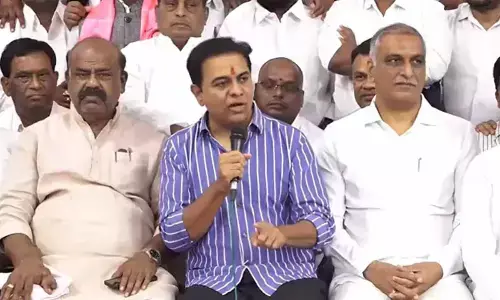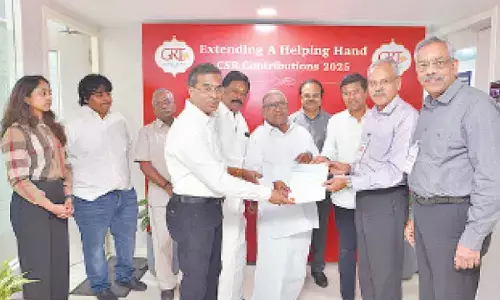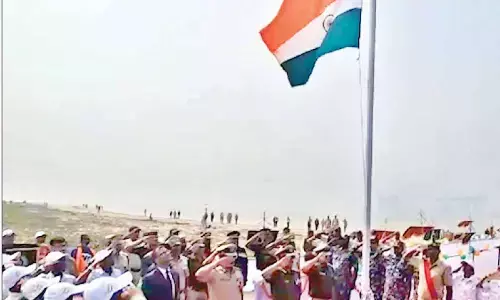Bringing the 'invisible majority' into the mainstream

Bringing the ‘invisible majority’ into the mainstream
Persons with disabilities (PwDs) constitute an "invisible majority" because "every one of us is liable to join their ranks", says an in-depth book on 2.1 per cent of the Indian population (20-million-plus) that suggests a six-point charter to bring them into the mainstream and enable them benefit the laws enacted for their uplift.
Persons with disabilities (PwDs) constitute an "invisible majority" because "every one of us is liable to join their ranks", says an in-depth book on 2.1 per cent of the Indian population (20-million-plus) that suggests a six-point charter to bring them into the mainstream and enable them benefit the laws enacted for their uplift.
"PwD's are rendered invisible because the fear of public humiliation keeps them indoors, or because an inaccessible environment forces even those who wish to venture out to remain locked in. They are also invisible when their disability is not physical. Society does not see the millions affected by 'invisible disabilities'. impairments and illnesses of the mind," C.K. Meena and V.K. Ferose write in "Invisible Majority - India's Abled Disabled" (Hachette).
"But PwD's are the majority because every one of us is liable to join their ranks. And also because we must include those whose lives are radically impacted and altered by being caregivers," the authors contend, adding that PwD's come from every class, gender, race, religion and community "and yet we often fail to grasp the magnitude of the invisible majority," the authors contend.
They lament that India is over half-a-century behind the West in its attempts to include PwD's into our society and maintain that the country's "recent progressive laws on disability will have to be translated into action on the ground" for them to have a tangible effect.
Also, though the country "does not yet have a cohesive group of PwDs - a sizeable 'us' who can forge a mass movement", there are many individuals who are asserting their identities and "have heaved aside mountainous obstacles" to carve out a track for themselves and for others like them.
"The disability rights act is perfect on paper. What is missing is the implementation. If everything it says gets translated into reality, India would be a utopia for PwDs," Meena and Ferose told IANS in a joint interview.
Also, the "disparate organisations working in their silos should work towards a common cause. A cross-disability advocacy organisation like the NCPEDP (National Centre for Promotion of Employment for Disabled People) can provide a common platform. The demand for inclusion should be loud and united", they said, adding: "India will become an inclusive nation only if mindsets are transformed.
"Toward this end, the authors suggest a six-point charter for a nationwide movement, "nothing less than an uprising, a powerful, overreaching, countrywide disability rights movement that brings together persons with every kind of disability and fights for total inclusion.
The charter
Be visible, be vocal Whatever may be the prevailing trend, PwDs in India should take ownership of the well-organised motto of the global disability rights movement, "Nothing about us without us" Thus far, reforms in the disability sector are all court-driven rather than society-driven but PwDs cannot wait for society to change its mindset. They should be self-advocates; lead from the front; demand their rights.
Rights, not charity: The NCPEDP keeps a sharp eye on potential violations of rights. When the government attempted to delete the provision in the Rights of Persons with Disability Act meting out punishment for those who humiliate or abuse PwDs, there was such a strong pushback from the NCPEDP and other disability organisations that the government hastily backed off. This, and certain other measures like the MANI (Mobile-Aided Note Identifier) app post-demonitisation constitute a slow awakening in fits and starts and must gather a steady momentum as disparate efforts must coalesce.
Need for cohesion: Disability organisations need to come together on a common platform. Now, each works and fights for the narrow, specific disability they are championing. It's a scarcity mindset that prevails, with each guarding what they believe is their own share of the pie.
Secure political space: Obviously, if PwDs have to move to leadership roles, more disability organisations need to be headed by them.
Change in the periphery: This is best explained by NCPEDP Executive Director Arman Ali, who heads the organisation since the demise in 2018 of Javed Abdi: When the remotest village becomes disability friendly, when a disabled child is able to go to a neighbourhood school in the village, then change will happen.
A Disability university: This will infuse technology into the sector while an institution for disability studies can focus on collating knowledge on the sector and recommending measures for implementation.
They also faulted stereotyping as "the main flaw in most media representations of PwDs". "The media should first of all understand what PwDs are capable of, not focus on their inabilities. They should not be looked upon with pity. But it is equally important to not put them up on a false pedestal. As our book says, �they are just like everyone else. No more, no less'," the authors added.
The book is a collaborative effort spanning continents. "Ferose has been in the disability space for over 10 years, reading widely about the subject and connecting with individuals and organisations in India and abroad. He wanted to distil all his learnings and experiences into one book, especially when he realised that there was no book in India which gives a comprehensive overview of disability in the country. At the same time he realised that since he lives in California he needed someone in India who would do the heavy lifting. Through a parent of an SAP Labs Bangalore employee he connected with me," Meena said.
"I've been in journalism for four decades and have three published novels under my belt. Ferose and I exchanged emails and after sussing each other out, realised we were on the same page. When we finally met in November 2018 we bonded instantly," Meena, a founding member of the Asian College of Journalism, added.











